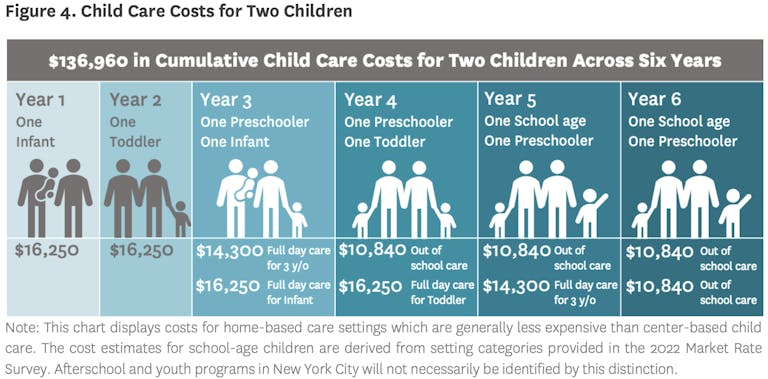

Accessible Child Care Would Make A Difference for All NYC Families, Keeping Them Here
Insights
December 19, 2023
By: Julie Kronick
The very fabric of our city’s economic success rests on a family’s ability to live and work here while ensuring their child’s well-being.
Child care is an essential service for working families and economic prosperity in communities. Not only does it positively impact childhood development, but it enables families to maintain economic security and make fewer difficult decisions between working and taking care of their youngest family members. We know from data that during the pandemic, women living with children in NYC are 2 ½ times more likely to cite child care as the reason for being out of work, and with child care unaffordability impacting 80% of NYC families, it is crucial we secure policies and investments that work towards universal child care. Right now, this also includes rejecting the Mayor’s severe budget cuts announced in his November Financial Plan–an action you can help us encourage our city leaders to take below!
Unaffordability is impacting families so significantly that data shows many are moving in search of a better cost-of-living. Working/middle-class families are leaving New York at the highest rates, and most cite affordability as the reason with a large emphasis on child care cost. According to a recent Fiscal Policy Institute report, more than 65,000 residents who made $32,000 to $65,000 left New York last year—this amounts to 2% of the population. In a New York Times piece on this trend, a 40-year-old mother of two with a $50,000 income is interviewed about why she left. The article reads, “Child care blew up her budget. To move to a two-bedroom apartment, she would have had to pay around $2,500 a month in Brooklyn. The lowest quote she received for day care was $2,700 a month.” That comes to $4,200 on just rent and child care alone, a price tag that’s high even for families making between $104,000 and $172,000, the next largest group of income earning families that left, totaling 58,000 people. These issues also disproportionately impact Black and Latine families, who were at least twice as likely to move out of the state as white residents, according to the Fiscal Policy Institute report. These earners are often the backbone of critical industries—including restaurants, public transportation, education, and even child care facilities/programs.

Child care access has been at the center of many conversations over the last few years as unaffordability has skyrocketed and issues distributing payments to contracted early childhood education programs have impacted the sector significantly. Adding to this, our recent data analysis on the cost of out-of-school care for children ages 6-12 (meaning after-school, summer, and during breaks) reveals the same trend as for families with children under five: 4 out of 5 cannot afford the cost. As mentioned at the top, the Mayor’s plan is specifically imposing budget cuts of historic magnitude on the early childhood education and youth service system that will decimate an already precarious situation for working families. This budget modification cuts millions from birth-to-five early education, COMPASS afterschool programs, and summer programming. You can read our analysis of the impact of these cuts here. Our report demonstrates that the budget modification could result in the loss of anywhere between 6,000 and 10,000 ECE slots and over 3,500 slots in COMPASS Afterschool. This also only represents one third of the total 15% reduction the Mayor plans to implement.
On top of the Fiscal Policy Institute’s report, more families are questioning their future in NYC specifically due to the Mayor’s November Financial Plan. Earlier this month the Daily News reported that parents are weary of their ability to afford raising a child without access to affordable child care, making difficult choices as a result, such as choosing between paying for health insurance and child care. The article also explained a forecasted analysis that anticipated enrollment at standard 3-K programs increasing by 18%, aligning a decrease in funds with an increase in demand, likely forcing many more families into financial difficulty.
Just as parents are struggling to afford child care and other high cost-of-living expenses in NYC, our communities cannot afford to lose more families due to untenable cuts to critical services. We know what will work to fix this issue and it begins with rejecting the Mayor’s budget cuts in full. That is the goal of our latest take action campaign on child care: tell our city leaders to reverse cuts to early childhood and youth services. Take action with us now to take a stand on protecting investments that support childhood education and impact well-being and development.
Going further and looking ahead at CCC’s related priorities, New York can make universal child care a reality for its residents, too. It’s easy to forget that free K-12 education was at one time considered far off from what was possible, and to forget that during World War II universal child care was instituted to support working mothers. CCC’s founder Eleanor Roosevelt was a supporter herself of maintaining the child care programs for the sake of community prosperity and child well-being—she wrote about her support for continued child care access in a September 1945 “My Day” column, citing letters she had received from working mothers. There is currently a bill (Intro 941) proposing Universal Child Care in New York City. A hearing was held on the bill in September of this year—learn more about the bill here.
We can make New York City a welcoming, comfortable place for families and we must not let our communities lose access to critical services like child care.
This post contains language and data provided by Alice Bufkin, Caitlyn Passaretti, Marija Drobnjak, & Rimsha Khan.



